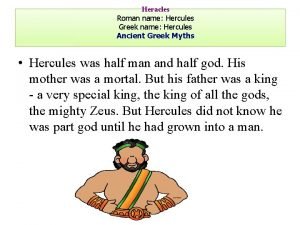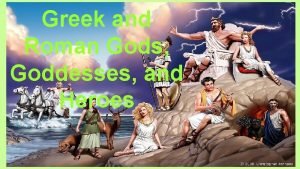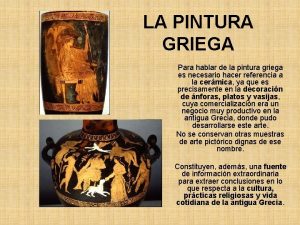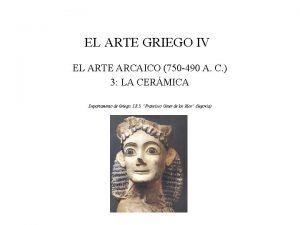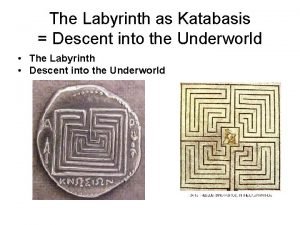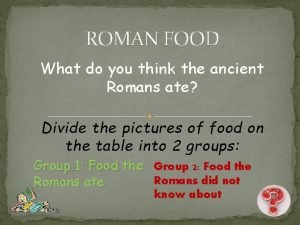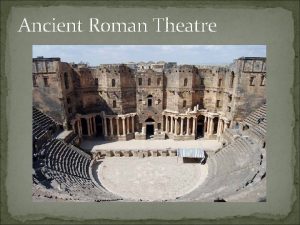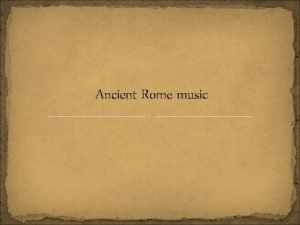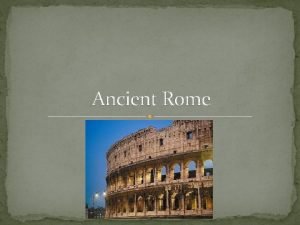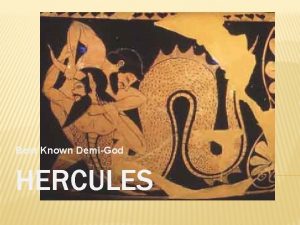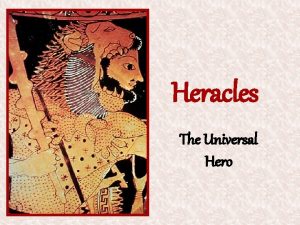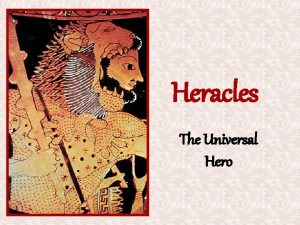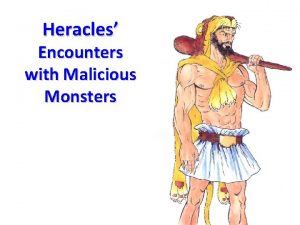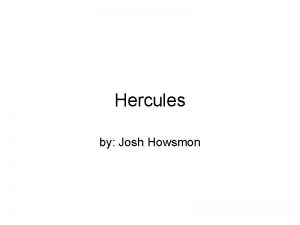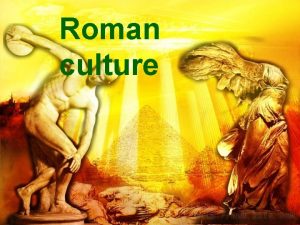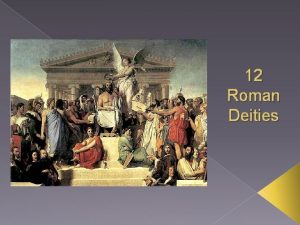Heracles Roman name Hercules Greek name Hercules Ancient
















- Slides: 16

Heracles Roman name: Hercules Greek name: Hercules Ancient Greek Myths • Hercules was half man and half god. His mother was a mortal. But his father was a king - a very special king, the king of all the gods, the mighty Zeus. But Hercules did not know he was part god until he had grown into a man.

• Right from the beginning, Hera, Zeus' wife, was very jealous of Hercules. She tried all kinds of ways to kill him, including sending a couple of big snakes into his crib. Hercules crushed those snakes in a flash! Hercules was incredibly strong, even as a baby!

• Zeus loved his little son. He figured that sooner or later Hera might actually find a way to kill little Hercules. • To keep his small son safe from attack, Zeus sent him to live with a mortal family on earth. Hercules grew up loved and noble. • But he didn't fit in on earth. He was too big and too strong. One day, his earth father told him he was a god, well, part god anyway.

• As the story goes. . . • Hercules had a cousin named Eurystheus (Eury for short). • Eury was the king of a little village in the citystate of Argos. Eury was an evil man. He thought everyone wanted to steal his crown, especially Hercules. • One day, when Hera and Eury were chatting about their mutual hatred for Hercules, Hera came up with a plan - a plan to kill Hercules!



• Hera helped Eury design 12 Labors (missions or tasks) that Hercules had to complete. Supposedly, when Hercules had completed the 12 Labors, he would earn his immortality, or so Hera promised. • But really, Hera and Eury were certain that one of their "labors" would surely kill Hercules, probably the very first one.

• People would go to places like these. They wanted to know their future. Apollo's helpers would tell the future • Pythia (Πυθία)

• Hercules was no fool. He asked the Oracle at Delphi if this was a smart thing to do. The oracle agreed that it was. Actually, the oracle had said, "If you complete 12 Labors, immorality will be yours. " Being an oracle, she never explained what she meant by "immortality" - would he live forever in legend or for real? Hercules never asked. (She would not have told him anyway. )


Τhe ancient Greeks built many, many temples. • Apollo enjoyed having temples built in his honor. He liked the gifts. He liked the attention. • Everyone knew that Apollo was the god of music. He also brought out the sun each day. He had other special powers. Apollo could see the future, not always, but sometimes. • Everyone wanted to know the future. So Apollo's temples were busy places, full of people full of questions about their future. His temples were so busy, in fact, that the stream of visitors asking him questions wore him out.



• Apollo decided he needed an assistant, a wise woman, an oracle. An oracle, in ancient Greece, was someone who could see the future. But Apollo did not want any old oracle to speak for him. He wanted a real one. The oracles he had met always had vague answers. • Not clear answers

Dodona oracle

 Hercules roman name
Hercules roman name Rhea symbol
Rhea symbol Copa ática decorada con atletas
Copa ática decorada con atletas Kylix exekias
Kylix exekias Odysseus descent into the underworld
Odysseus descent into the underworld ánfora ática, decorada con heracles y el toro minos
ánfora ática, decorada con heracles y el toro minos Means of communication in ancient times
Means of communication in ancient times Ancient india vs ancient china
Ancient india vs ancient china Modern american floral design
Modern american floral design Rich roman food
Rich roman food White face clowns
White face clowns Ancient roman plays
Ancient roman plays Roman villa sale
Roman villa sale Ancient egyptian toothbrush
Ancient egyptian toothbrush Ancient rome dance
Ancient rome dance Famous roman landmarks
Famous roman landmarks Ancient roman deities most resembled
Ancient roman deities most resembled
